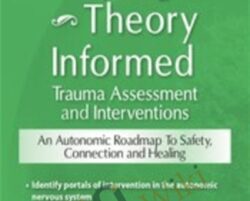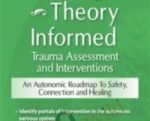If our clients could have thought their way out of the impact of trauma, they would have done that a long time ago.Trauma resolution is not about thinking. Healing depends, instead, on the work undertaken at the level of the autonomic nervous system, which shapes our clients’ experiences of safety and influences their capacity for connection. Traumatic events have a far-reaching impact on this system. Autonomic pathways trigger survival responses that often lead our clients on a painful journey into a state of shutdown, collapse, and dissociation. How can we help our clients find their way back to safety, and how do we prevent it from happening in the first place?Polyvagal Theory, developed by Stephen Porges, offers a revolutionary roadmap to lead clients out of their adaptive survival responses into the autonomically regulated state of safety that is necessary for successful trauma treatment. Dr. Porges’ colleague and author of The Polyvagal Theory in Therapy, Deb Dana, shares this roadmap with you in this exciting recording.You will become fluent in the language of Polyvagal Theory and confident in your ability to help clients safely tune into and reshape their nervous systems, and rewrite the trauma stories that are carried in their autonomic pathways. Come learn the organizing principles of Polyvagal Theory and work with practices designed to help clients move out of despair and isolation and return to a place of awareness, connection, and social engagement.Describe the principles of Polyvagal Theory and how to communicate them in client friendly language.Explore three circuits of the autonomic nervous system for the purpose of client psychoeducation.Analyze how the autonomic nervous system operates as an internal surveillance system and its impact on clients’ habitual responses to trauma.Determine how to help clients engage the regulating capacities of the autonomic nervous system in order to create an environment of safety.Explain how to exercise the Social Engagement System to assist clients in becoming more adept in skills of co-regulation and creating reciprocal relationships.Assess for patterns in clients’ autonomic states to better inform treatment planning.Summarize the trauma-informed therapist’s role as co-regulator and its impact on clinical outcomes.Identify portals of intervention in the autonomic nervous system to more effectively establish safety and treat trauma.Discover the right degree of neural challenge and exercises to employ with clients to help shape the autonomic nervous system toward safety and connection.Examine how to work with the cycle or reciprocity-rupture-repair in helping clients achieve the biological need for connection.Design a Polyvagal-informed clinical practice based on appropriate assessment and treatment planning.Examine ethical issues, research limitations, and potential risks to be considered by a Polyvagal-informed therapistGet 2-Day Workshop: Polyvagal Theory Informed Trauma Assessment and Interventions: An Autonomic Roadmap to Safety, Connection and Healing – Deborah Dana, Only Price $119ESSENTIALS OF POLYVAGAL THEORYEvolution of the autonomic nervous systemHow trauma influences autonomic profilesThree organizing principlesNeuroception: Detection without perceptionHierarchy: 3 predictable pathways of responseCoregulation: The biological imperativeNEUROCEPTION AND THE SHAPING OF AUTONOMIC PATHWAYSUnderstand the internal surveillance systemTrack cues of safety and dangerEveryday “biological rudeness”Trauma, autonomic wisdom, and cognitive overrideNAVIGATE THE AUTONOMIC HIERARCHYExploring three autonomic circuitsSympathetic branchVentral vagal pathwayDorsal vagal pathwayHow trauma shapes cycles of autonomic responseEngage the regulating capacities of the autonomic nervous systemIntroduction to autonomic mappingTHE SOCIAL ENGAGEMENT SYSTEMThe five elements of the Social Engagement SystemWhat happens when parts of the system are unavailable?Using the Social Engagement System to regulate statesExercising the Social Engagement SystemTRACKING AUTONOMIC STATESSeeing patterns over timeUse micro-moments to resource changeExplore the blended states of play and stillnessCreate autonomic anchorsMEETING THE BIOLOGICAL NEED FOR CONNECTIONMapping the continuum of solitude to socialityCreate safety in co-regulationWorking with the cycle of reciprocity – rupture – repairSHAPING THE AUTONOMIC NERVOUS SYSTEM TOWARD SAFETYIdentify portals of interventionCreate neural exercisesUse breath as a regulatorResourcing new patterns through movementExplore the autonomic response to touchUse autonomic imageryINCORPORATING POLYVAGAL THEORY IN CLINICAL PRACTICEGetting comfortable teaching Polyvagal Theory to clientsTracking the 8 steps of a Polyvagal-Informed clinical sessionPolyvagal-Informed assessment and treatment planningPolyvagal Theory and Phase I trauma treatmentRESPONSIBILITIES OF A POLYVAGALINFORMED THERAPISTThe guiding questionsEthical considerationsResearch limitations and potential risksGet 2-Day Workshop: Polyvagal Theory Informed Trauma Assessment and Interventions: An Autonomic Roadmap to Safety, Connection and Healing – Deborah Dana, Only Price $119Tag: 2-Day Workshop: Polyvagal Theory Informed Trauma Assessment and Interventions: An Autonomic Roadmap to Safety, Connection and Healing – Deborah Dana Review. 2-Day Workshop: Polyvagal Theory Informed Trauma Assessment and Interventions: An Autonomic Roadmap to Safety, Connection and Healing – Deborah Dana download. 2-Day Workshop: Polyvagal Theory Informed Trauma Assessment and Interventions: An Autonomic Roadmap to Safety, Connection and Healing – Deborah Dana discount.
 Guided By The Universe – Kimberley Wenya
₹13,778.00
Guided By The Universe – Kimberley Wenya
₹13,778.00
 Modern Girl Manifestation Coach College – Kimberley Wenya
₹17,098.00
Modern Girl Manifestation Coach College – Kimberley Wenya
₹17,098.00
2-Day Workshop: Polyvagal Theory Informed Trauma Assessment and Interventions: An Autonomic Roadmap to Safety, Connection and Healing – Deborah Dana
₹19,090.00



